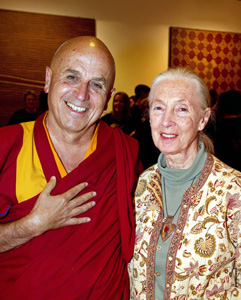Matthieu: There is an unbroken connection and continuity between the various animal species and humans. The reality of this continuum should make humans re-examine the way we treat other animals
Jane Goodall: There is of course no question that there is a continuity of feelings and emotions. There is no question that animals feel pain. I don’t know how far down the scale of species it goes, but I am sure that insects feel some kind of pain since they avoid bad stimulus. In the case of animals with more complex brains it is not only the pain they experience, but also the fear and the suffering, mental suffering as well as physical.
What I find so extraordinary is that people seems to be almost schizophrenic when you speak to them about the terrible conditions in the intensive animal ‟farms”, this cruel cramming of sentient beings into tiny spaces — so bad that to keep them alive you have to give them antibiotics all the time otherwise they just give up. I tell people about the transportation nightmare, about the abattoirs where so many animals aren’t even stunned before they are skinned alive, plunged into boiling water. It is horrible. If they fall while being transported, they are pulled up by one leg that gets broken. It is obviously excruciatingly painful. When I tell this to some people, they often reply, ‟Oh please don’t tell me, I am very sensitive, I love animals.” And I think, ‟What’s gone wrong in that brain!”
The practices of the food industry, the meat eating industry, is particularly shocking because they are condoned by governments and by the people. Even if they do not consciously condone it, they are doing so by eating meat. And these practices are increasing as more and more people want to eat more and more meat. It is destroying the environment, it’s shrinking water supplies, and it’s wasting huge amounts of energy, transforming vegetable protein into animal protein in totally wasteful ways (it takes 10g of proteins from plants to make 1g of meat protein). That’s all quite separate from the huge suffering, the massive, massive, the endless suffering going on everyday. It’s suffering from birth to death.
I grew up eating bits of meat, because we all ate meat, we didn’t even think about where it came from and so on. I only learned about ‟intensive farming,” or the cruel way that animals are bred and slaughtered when I first came back from Gombé, because it started in England before I left. I looked at this piece of meat on my plate, and I thought: ‟That symbolizes fear, pain, death.” That was the last bit of meat that I ever looked at on a plate of mine. I haven’t touched meat or fish since.
But in addition to that, there is the animal testing that is going on. It’s pharmaceutical, which is the worst, and then it’s medical. They are supposed to be guidelines, rules and regulations, but they are most of the time not enforced. Here again, you get this schizophrenia: a man has a home, wife and children, and a dog. He talks about his dog as a member of the family, he says, ‟she understands everything I say”. Then he goes into a lab, puts on a white coat and does unspeakable things to dogs.
In veterinarian schools in America, not in England, they differentiate between the animals they treat. One group has owners, who can pay for the treatments. The others are the animals that are being used for experiments. They have an X on their door. And they don’t get proper anesthetics or anything like that. I know a wonderful philosopher who uncovered all this, Bernard Rollin. He could not understand why young people who went to vet schools, who were really passionate about the animals, loved animals, and wanted to help them, six years later came out cold and indifferent. Gradually their empathy had been killed.
 With Jane, in Brisbane, Australia
With Jane, in Brisbane, Australia